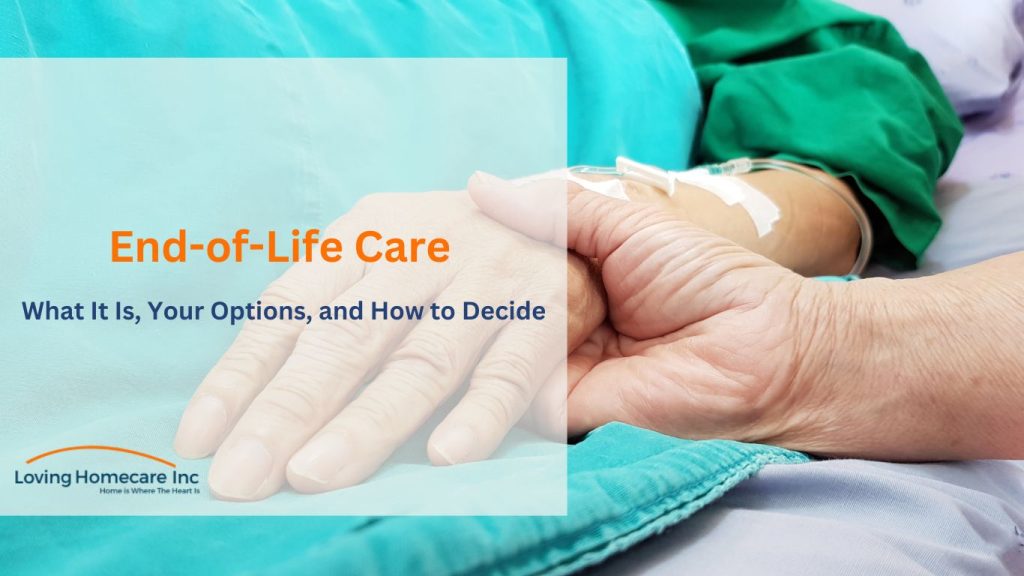Recently updated on January 21st, 2026 at 10:14 am
End of life care is a specialty care that comforts patients in the last stages of an illness and their families at this difficult time. Comfort, dignity, and quality of life would be all emphasized in medical treatments, emotional support, and compassionate caregiving. While there are several options available for end-of-life care, individuals and families find it overwhelming to make the proper choice.
It is estimated that 10 million people will need end-of-life care by 2050 in OECD countries.
Today, end-of-life care is rapidly evolving with major trends including the adoption of advanced digital technologies like telehealth and AI for predictive analytics, expanded care models such as the Program of All-Inclusive Care for the Elderly (PACE), and a renewed focus on holistic, comfort-centered approaches that enhance dignity and quality of life.
For more information on end-of-life services, consider making an appointment with Loving Homecare Inc, a healthcare provider, to develop a care plan that meets your individual needs.
What Does End-of-Life Care Mean?
End-of-life care is a tailor-made and specific approach toward care, which is dedicated to those who are deemed near the end of life due to terminal diagnoses or age-related diseases. It is provided not for the prolongation of life but to comfort them through the last phase of peace.
This type of care prioritizes:
Relieving pain and other symptoms-ensuring comfort of the body.
- Emotional and spiritual support: Bringing comfort and resolving one’s basic existential dilemma.
- Family involvement in end-of-life care: Engaging families to make decisions and cope with the process.
At its core, end-of-life care focuses on the quality of life in end-of-life care, ensuring that patients are treated with respect and dignity.
Benefits of End-of-Life Care
The benefits of end-of-life care also transcend physical relief to emotional, spiritual, and family needs.
Physical Benefits:
- Pain and Symptom Management: Modern protocols use digital symptom tracking, rapid-acting medications, and AI-driven analytics to manage discomforts like pain, nausea, or dyspnea, enhancing personalized care and rapid response.
- Improved Mobility: Therapies that reduce stiffness and increase movement.
Emotional and Psychological Benefits:
- Emotional Support in End-of-Life Care: Patients are counseled on how to handle anxiety, depression, or fear of the unknown.
- Family Involvement in End-of-Life Care: Families receive guidance on coping strategies and grief support.
Spiritual Benefits:
- Compassionate End-of-Life Care: Addressing existential concerns and providing a sense of peace through spiritual counseling or rituals.
Choosing the Right End-of-Life Care:
 Choosing the right end-of-life care for a loved one is a deeply personal decision and one that requires much thought regarding the patient’s physical, emotional, and spiritual needs.
Choosing the right end-of-life care for a loved one is a deeply personal decision and one that requires much thought regarding the patient’s physical, emotional, and spiritual needs.
Types of End-of-Life Care Options
1. Hospice Care:
The designation for hospice care focus during this period comforts the patient, pain management, and emotional support, rather than further curative treatments.
When to Choose Hospice Care:
- Terminal Illness Confirmation: The patient has confirmed proof of a terminal illness: advanced cancer, late-stage dementia, end-stage heart disease.
- Shift to Comfort Care: The focus shifts from curing the illness to ensuring the patient is as comfortable as possible.
- Holistic Support: Hospice care now integrates telehealth, AI for risk assessment, and Virtual Reality for comfort, addressing physical, emotional, social, and spiritual concerns through technology-enhanced methods and digital legacy tools.
Key Benefits:
- This includes symptom management, pain relief, and palliative therapies.
- The patients and their families are given emotional and spiritual counseling.
- Support services, including grief counseling or bereavement support following the death of the patient.
2. Palliative Care:
Palliative care is available at any stage of serious illness treatment; it focuses on the relief of symptoms and pain management concerning quality of life improvements.
When to Choose Palliative Care:
- Symptom Management: Utilizing digital symptom diaries and interdisciplinary teams, palliative care manages complex symptoms like pain, fatigue, or breathlessness, often incorporating disease-specific protocols and emerging therapies such as psychedelic-assisted treatment for existential distress.
- Concurrent Treatment: Palliative care is indicated when the client is receiving other treatments to prolong life, such as chemotherapy or dialysis.
- Extended Timeline: Care often starts at the time of diagnosis and continues throughout the course of illness, including through the terminal stages of life.
Key Benefits:
- Comprehensive and patient-specific symptom relief.
- Emotional benefits include being in one’s comfort zone surrounded by loved ones.
- Flexibility in adjusting the level of care as the condition of the patient dictates.
3. In-Home Senior Care:
In-home senior care now includes wearable devices for safety monitoring, smart home technology for independence, and remote family involvement platforms, allowing patients to stay in their homes while receiving comprehensive, personalized support. This service is ideal for those patients who would like to maintain independence yet require some assistance.
When to Choose In-Home Senior Care:
- Desire to Stay Home: The patient prefers the comfort of their own home.
- Family Support: Caregiving by family members, supplemented by professional caregivers when necessary.
- Mild to Moderate Needs: Assistance with personal care, meal preparation, medication management, or companionship may be needed.
Key Benefits:
- Care plans are tailored to the patient’s particular needs.
- Emotional benefits, being in one’s comfort zone surrounded by loved ones.
- Flexibility in adjusting the level of care, as the condition of the patient dictates.
4. Residential Care:
 Professional supervision and support on a 24-hour basis. Besides, residential care, including nursing homes and assisted living facilities, is the appropriate type of care for those who require continuous medical attention and professional caregiving.
Professional supervision and support on a 24-hour basis. Besides, residential care, including nursing homes and assisted living facilities, is the appropriate type of care for those who require continuous medical attention and professional caregiving.
When to Choose Residential Care:
Need for Continuous Treatment: The patient has complex medical or advanced illness needs that require constant care.
Limited Family Availability: Family members cannot always provide care or supervision.
Conditions that are progressive: Advanced stages of Alzheimer’s disease or late stages of Parkinson’s disease may require care on residential grounds.
Key Benefits:
- Continuous availability of skilled nursing and medical professional care.
- A Structured environment with routine activities and social interaction.
- Availability of special services such as physical therapy and memory care.Effectiveness and challenges are key considerations in modern end-of-life care. Digital monitoring and AI-driven protocols improve symptom control and reduce hospitalizations, while challenges like technology adoption among the elderly and regulatory complexities require adaptable systems and ongoing staff education to ensure compassionate, personalized care.
Making the Right Choice
Choosing the appropriate end-of-life care requires an evaluation of the patient’s medical condition, the patient’s personal wishes, and the ability of the family to provide care. Here are key factors to consider:
- Patient’s Wishes: Respect the patient’s desires regarding their care and quality of life.
- Level of Care: Determine the level of medical or personal care needed.
- Family Support Assessment: Assess the availability and ability of family members to provide support.
- Financial Consideration: The cost of care versus insurance or financial resource availability.
Conclusion
It is a sensitive and compassionate time in a patient’s life when comfort, dignity, and support are given while entering the last stages of life. Whether one opts for hospice care, palliative care, or just in-home senior care, it should always be about the will of the patient and his quality of life.
By understanding what is end-of-life care is and exploring the types of end-of-life care, with Loving Homecare so families can make informed choices that provide peace of mind and honor their loved one’s journey.
By understanding what is end-of-life care is and exploring the types of end-of-life care, families can make informed choices that provide peace of mind and honor their loved one’s journey.
For more information on end-of-life services, consider speaking with a healthcare provider to create a care plan tailored to your unique needs.


